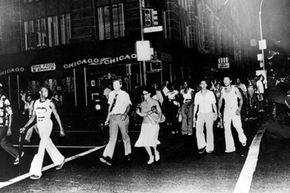You may remember the blackout that occurred on Aug. 14, 2003. It was the biggest in U.S. history. And just like every major blackout, it raised a lot of questions about how the power-distribution system works.
At a high level, the power grid is a very simple thing. It consists of a set of large power plants (hydropower plants, nuclear power plants, etc.) all connected together by wires. One grid can be as big as half of the United States. (See How Power Distribution Grids Work to learn about the different pieces of the grid.)
Advertisement
A grid works very well as a power-distribution system because it allows a lot of sharing. If a power company needs to take a power plant or a transmission tower off line for maintenance, the other parts of the grid can pick up the slack.
The thing that is so amazing about the power grid is that it cannot store any power anywhere in the system. At any moment, you have millions of customers consuming megawatts of power. At that same moment, you have dozens of power plants producing exactly the right amount of power to satisfy all of that demand. And you have all the transmission and distribution lines sending the power from the power plants to the consumers.
This system works great, and it can be highly reliable for years at a time. However, there can be times, particularly when there is high demand, that the interconnected nature of the grid makes the entire system vulnerable to collapse. In this article, we'll find out what happens to cause a blackout and see what steps you can take to prepare yourself for an extended power outage.
First, why do widespread blackouts occur if there are so many potential back-ups in the system?
Advertisement


